Related Research Articles
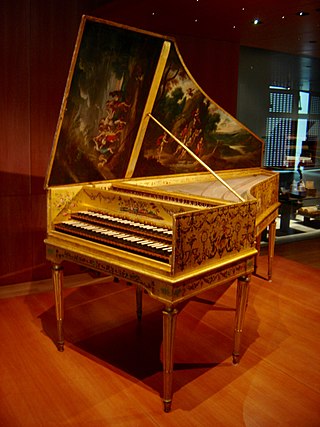
A harpsichord is a musical instrument played by means of a keyboard. This activates a row of levers that turn a trigger mechanism that plucks one or more strings with a small plectrum made from quill or plastic. The strings are under tension on a soundboard, which is mounted in a wooden case; the soundboard amplifies the vibrations from the strings so that the listeners can hear it. Like a pipe organ, a harpsichord may have more than one keyboard manual, and even a pedal board. Harpsichords may also have stop buttons which add or remove additional octaves. Some harpsichords may have a buff stop, which brings a strip of buff leather or other material in contact with the strings, muting their sound to simulate the sound of a plucked lute.

A keyboard instrument is a musical instrument played using a keyboard, a row of levers that are pressed by the fingers. The most common of these are the piano, organ, and various electronic keyboards, including synthesizers and digital pianos. Other keyboard instruments include celestas, which are struck idiophones operated by a keyboard, and carillons, which are usually housed in bell towers or belfries of churches or municipal buildings.

Barnstaple is a river-port town in North Devon, England, at the River Taw's lowest crossing point before the Bristol Channel. From the 14th century, it was licensed to export wool from which it earned great wealth. Later it imported Irish wool, but its harbour silted up and other trades developed such as shipbuilding, foundries and sawmills. A Victorian market building survives, with a high glass and timber roof on iron columns. The parish population was 24,033 at the 2011 census, and that of the built-up area 32,411 in 2018. The town area with nearby settlements such as Bishop's Tawton, Fremington and Landkey, had a 2020 population of 46,619.
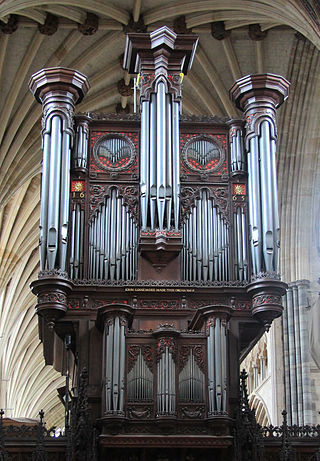
John Loosemore was an English builder of pipe organs. He is best known for his organ at Exeter Cathedral in Devon, which he completed in 1665.

South Molton is a town in Devon, England. It is part of the North Devon local government district. The town is on the River Mole. According to the 2001 census the civil parish of South Molton had a population of 4,093, increasing to 5,108 at the 2011 Census. The town also has an electoral ward with the same name. The population of this ward at the same census was 4,875 We have therefore the unusual situation where the town is larger than the ward. The town was one of the boroughs reformed by the Municipal Reform Act 1835. It retained this status as a municipal borough until 1967, when it became a rural borough in the South Molton Rural District.
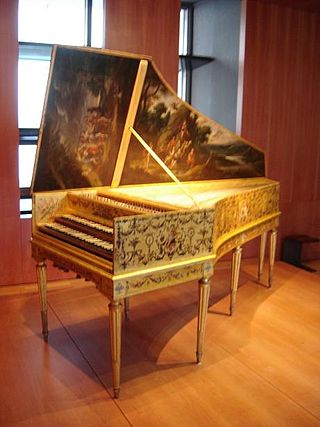
Pascal-Joseph Taskin was a Belgium-born French harpsichord and piano maker.

Saint Vedast Foster Lane or Saint Vedast-alias-Foster, a church in Foster Lane, in the City of London, is dedicated to St. Vedast, a French saint whose cult arrived in England through contacts with Augustinian clergy.
The Kirkman family were English harpsichord and later piano makers of Alsatian origin, active from the 1770s until the late 1800s.
Americus Backers, sometimes described as the father of the English grand pianoforte style, brought the hammer striking action for keyboard instruments from his master Gottfried Silbermann's workshop in Freiburg to England in the mid-18th century. Unlike the eleven other ex-apprentices of Silbermann who followed him to England and built square pianos with his action, Backers developed Silbermann's action into a reliable, powerful and responsive form that he built into a grand harpsichord case and added two tonal effects – una corda and damper lift – activated by pedals built into the dedicated trestle stand, again his original innovation. This new instrument altered the landscape of English music, causing composers and musicians to consign the plucked string harpsichord and its music to history. It is upon Americus's design that the modern grand pianoforte we know today is based.

Swimbridge is a village, parish and former manor in Devon, England. It is situated 4 miles (6.4 km) south-east of Barnstaple and twinned with the town of St.Honorine Du Fay in Normandy, France. It was the home of the Rev. John "Jack" Russell who first bred the Jack Russell Terrier.
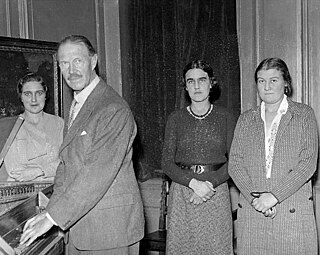
Major George Henry Benton Fletcher was a collector of early keyboard instruments including virginals, clavichords, harpsichords, spinets and early pianos. His collection is currently housed and kept in playing condition by the National Trust in Fenton House, a beautiful late 17th century merchant's house in, Hampstead, north London.

John Snetzler was an organ builder of Swiss origin, who worked mostly in England. Born in Schaffhausen in 1710, he trained with the firm of Egedacher in Passau and came to London about 1741. When he retired in 1781, his business continued and ended up with Thomas Elliot. Snetzler died in Schaffhausen on 28 September 1785.
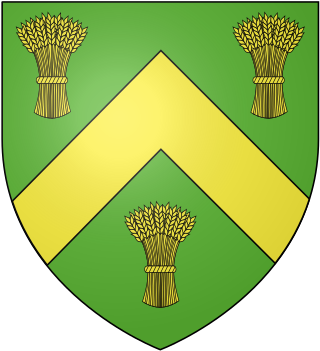
Sir George Amyand, 1st Baronet was a British Whig politician, physician and merchant.
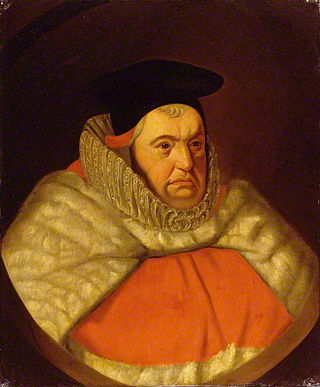
Sir John Doddridge was an English lawyer, appointed Justice of the King's Bench in 1612 and served as Member of Parliament for Barnstaple in 1589 and for Horsham in 1604. He was also an antiquarian and writer. He acquired the nickname "the sleeping judge" from his habit of shutting his eyes while listening intently to a case. As a lawyer he was influenced by humanist ideas, and was familiar with the ideas of Aristotle, and the debates of the period between his followers and the Ramists. He was a believer in both the rationality of the English common law and in its connection with custom. He was one of the Worthies of Devon of the biographer John Prince (d.1723).
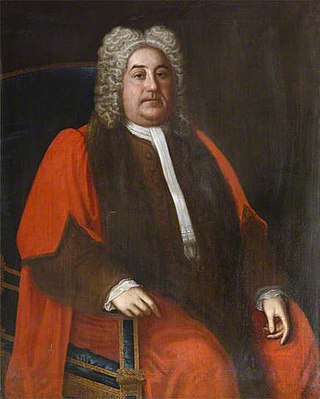
Benjamin Incledon (1730–1796) of Pilton House, Pilton, near Barnstaple in North Devon, was an English antiquarian and genealogist. He served as Recorder of Barnstaple (1758–1796).
Samuel Badcock (1747–1788) was an English nonconformist minister, theological writer and literary critic.
The keyboard section of an orchestra or concert band includes keyboard instruments. Keyboard instruments are not usually a standard member of a 2010-era orchestra or concert band, but they are included occasionally. In orchestras from the 1600s to the mid-1750s, a keyboard instrument such as the pipe organ or harpsichord normally played with an orchestra, with the performer improvising chords from a figured bass part. This practice, called basso continuo, was phased out after 1750.
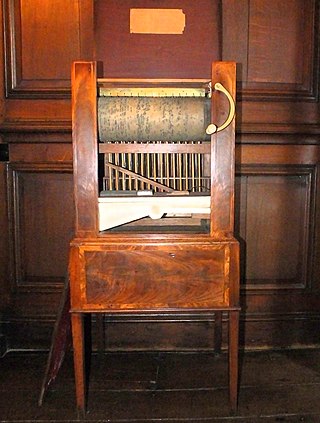
John Langshaw (1725–1798) was an English organist and an organ-builder. Leaving organ cases to others, he specialised in the mechanics, in particular those of chamber barrel organs. He left his native Lancashire to work in London, but returned to Lancashire in 1770.

St Peter's Church is the parish church of the town of Barnstaple in North Devon, England. Parts of the church date to the 13th-century with much restoration during the Victorian era by George Gilbert Scott and later by his son John Oldrid Scott which changed the atmosphere of the building, although many fine wall monuments and tablets remain. The church comes under the Diocese of Exeter.

The Recorder of Barnstaple was a recorder, a form of senior judicial officer, usually an experienced barrister, within the jurisdiction of the Borough of Barnstaple in Devon. He was usually a member of the local North Devonshire gentry. The position of recorder of any borough carried a great deal of prestige and power of patronage. The recorder of a borough was often entrusted by the mayor and corporation to nominate its Members of Parliament, as was the case with Sir Hugh I Pollard, Recorder of Barnstaple, who in 1545 nominated the two MP's to represent the Borough of Barnstaple. In the 19th century a recorder was the sole judge who presided at a Quarter Sessions of a Borough, a "Court of Record", and was a barrister of at least five years' standing. He fixed the dates of the Quarter Sessions at his own discretion "as long as he holds it once every quarter of a year", or more often if he deemed fit.
References
- ↑ Register of baptisms for All Saints, North Molton, Devon
- ↑ Libin, Laurence (1989). A Nineteenth-Century Album of English Organ Cases. Metropolitan Museum Journal (Vol 24, pp 275-284)
- ↑ Per inscription on the instrument's nameboard
- ↑ Recorded in The National Pipe Organ Register
- ↑ Recorded in The National Pipe Organ Register
- ↑ Westminster Rate Books
- ↑ Organa Britannica: Organs in Great Britain 1660-1860 (Vol 1 p98)
- ↑ Register of Burials for Holy Trinity, Lambeth, Clapham, London
- ↑ National Archives, Reference PROB 11/1008/313